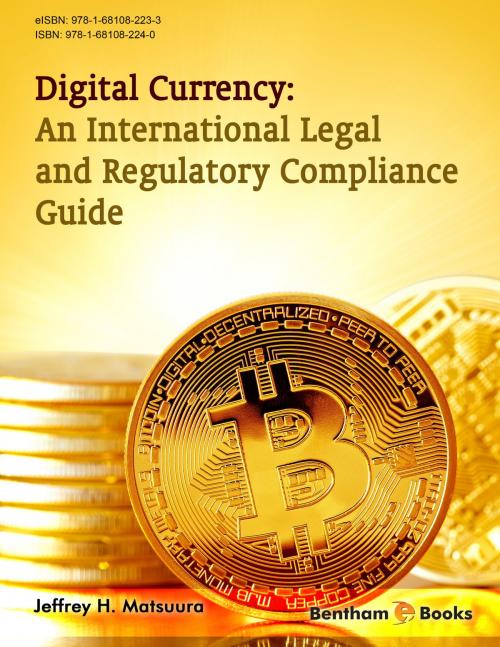Digital Currency: An International Legal and Regulatory Compliance Guide
Nonfiction, Reference & Language, Law, Business, Computers, Internet, Electronic Commerce| Author: | Jeffrey H. Matsuura | ISBN: | 9781681082233 |
| Publisher: | Bentham Science Publishers | Publication: | January 20, 2016 |
| Imprint: | Language: | English |
| Author: | Jeffrey H. Matsuura |
| ISBN: | 9781681082233 |
| Publisher: | Bentham Science Publishers |
| Publication: | January 20, 2016 |
| Imprint: | |
| Language: | English |
Digital or ‘virtual’ currencies pose significant challenges for government, financial and legal institutions because of their non-physical nature and their relative anonymity to physical currency. These attributes make this form of exchange extremely volatile and, at the same time, attractive to criminals. Many countries around the world have, therefore issued warnings against the use of digital currencies and have enacted laws to regulate and in some cases, restrict their use among members under their respective jurisdictions. Digital Currency: An International Legal and Regulatory Compliance Guide serves as a primer for both general and specialized readers, as well as business law and e-commerce teachers and students, to recognize and understand the extensive network of laws and regulations already in place around the world which have a profound impact on the creation, distribution and use of digital currency and blockchain technology. The book is also a compliance guide assisting legal practitioners in the fields of business, law, and technology to develop, implement, manage, and maintain strategies, policies, practices, and procedures to ensure that their activities involving digital currency and blockchain technology comply with a complex set of legal requirements in several jurisdictions. The book addresses both the complex set of existing laws that have a profound impact on digital currencies and blockchain technology, and the emerging new legal requirements directed specifically towards digital currency. Readers will understand the broad implications of laws and regulations on digital currency and blockchain development and its use, and will also be equipped with the knowledge to incorporate these effectively into their professional and personal endeavors. This entails maximizing the value of digital currency and blockchain technology while also minimizing their risk of adverse legal consequences. Additionally, policymakers seeking to enforce current legislations or wishing to draft appropriate new regulations in the digital currency and blockchain economy will also benefit from the information provided in this book.
Digital or ‘virtual’ currencies pose significant challenges for government, financial and legal institutions because of their non-physical nature and their relative anonymity to physical currency. These attributes make this form of exchange extremely volatile and, at the same time, attractive to criminals. Many countries around the world have, therefore issued warnings against the use of digital currencies and have enacted laws to regulate and in some cases, restrict their use among members under their respective jurisdictions. Digital Currency: An International Legal and Regulatory Compliance Guide serves as a primer for both general and specialized readers, as well as business law and e-commerce teachers and students, to recognize and understand the extensive network of laws and regulations already in place around the world which have a profound impact on the creation, distribution and use of digital currency and blockchain technology. The book is also a compliance guide assisting legal practitioners in the fields of business, law, and technology to develop, implement, manage, and maintain strategies, policies, practices, and procedures to ensure that their activities involving digital currency and blockchain technology comply with a complex set of legal requirements in several jurisdictions. The book addresses both the complex set of existing laws that have a profound impact on digital currencies and blockchain technology, and the emerging new legal requirements directed specifically towards digital currency. Readers will understand the broad implications of laws and regulations on digital currency and blockchain development and its use, and will also be equipped with the knowledge to incorporate these effectively into their professional and personal endeavors. This entails maximizing the value of digital currency and blockchain technology while also minimizing their risk of adverse legal consequences. Additionally, policymakers seeking to enforce current legislations or wishing to draft appropriate new regulations in the digital currency and blockchain economy will also benefit from the information provided in this book.















